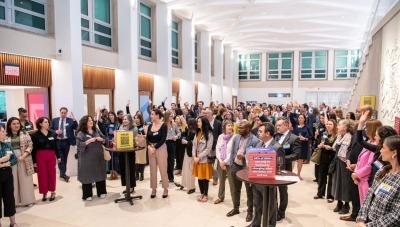WRAP opens new office in Washington DC to promote circular living
The new ‘WRAP in the Americas’ office, which officially opened last week in Washington DC, has been set up to scale WRAP’s circular initiatives across South, Central and North America.
The charity will focus on food waste, plastic pollution and textile waste, in a bid to tackle the unsustainable production and consumption habits of individuals and businesses.
 At the official opening of the new office at the British Embassy in Washington DC, Leah Karrer, Executive Director of WRAP in the Americas, announced: “I am thrilled to scale-up WRAP’s work here in the Americas to create a future that is circular.”
At the official opening of the new office at the British Embassy in Washington DC, Leah Karrer, Executive Director of WRAP in the Americas, announced: “I am thrilled to scale-up WRAP’s work here in the Americas to create a future that is circular.”
“We are launching with a bang – food waste, plastic pollution, and textiles are all under the spotlight – we’ll be changing the key things we consume in our daily lives to a more sustainable model of circular living!”
“Our presence gives us a base from which to scale initiatives in [the] USA, Brazil, Canada, Chile, Colombia and Mexico, working closely with partners to deliver lasting, measurable change towards a sustainable future.”
WRAP already has offices in the UK and Australia and runs programmes in Africa, Asia and the Pacific, the UK and Europe.
What will the new office do?
In line with WRAP’s wider strategy, WRAP in the Americas will collaborate with partners to coordinate a range of citizen-facing campaigns and programmes for businesses.
The Americas office is already working with groups in Brazil to launch the country’s first nationwide food waste voluntary agreement, similar to Mexico’s Pacto por la Comida and the Pacific Coast Food Waste Commitment, both of which aim to cut food waste in half by 2030.
The new office is also helping to change behaviours related to food waste in Canada and deliver Plastics Pacts across Canada, the USA, Chile, Colombia and Mexico.
WRAP’s UK Plastic Pact, launched in 2018 in collaboration with the Ellen McArthur Foundation, is a voluntary commitment that brings together businesses, governments and NGOs to develop a circular economy for plastics.
Laura Reyes, Executive Director at circular economy NGO Cempre Colombia, commented "WRAP has played a key role in the implementation of the Colombian Plastics Pact. I am delighted to see WRAP's growth in the Americas.”
“I am confident that this increased presence will further strengthen the circularity of plastics, inspiring more organisations and initiatives to come together to accelerate the transition to a circular economy for plastics.”
Dr. Carla Calderón Rosas, from the non-profit Fundación Chile, added: “Since we joined the Plastic Pact Network in 2019, the technical support provided by WRAP has been fundamental in our journey to accelerate the transition to a circular economy for plastics.”
“Additionally, it has allowed us to incorporate international expertise into our work and strengthen our technical capacities.”
“The opportunity to be constantly connected with the WRAP team, and through them, with other Pacts worldwide, has been tremendously enriching, allowing us to exchange knowledge and experiences, fostering collaboration, and promoting the adoption of sustainable practices and strategies in the industry and society as a whole.”
Another important strand of WRAP’s work in the Americas sees the charity developing new standards for circular products, due to be released later this year.
Tackling climate change
WRAP CEO, Harriet Lamb, highlighted the importance of targeting circular economy issues: “WRAP has worked globally for over 20 years and today we are stepping up our determination to tackle the climate crisis.”
“Nearly half of global emissions can only be tackled by changing the way we make and consume food and products. That’s why in the Americas we are focusing on tackling waste in clothing and food, plastics pollution and promoting circular living.”
WRAP’s work in the Americas has been made possible with the support of a number of key US funding institutions including The Posner Foundation and the Ballmer Group as well as UKRI.









